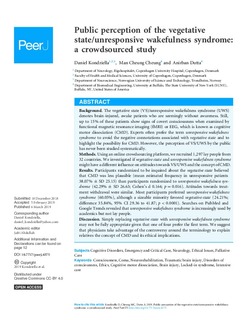| dc.contributor.author | Kondziella, Daniel | |
| dc.contributor.author | Cheung, Man Cheung | |
| dc.contributor.author | Dutta, Anirban | |
| dc.date.accessioned | 2019-09-30T07:08:40Z | |
| dc.date.available | 2019-09-30T07:08:40Z | |
| dc.date.created | 2019-07-19T13:03:31Z | |
| dc.date.issued | 2019 | |
| dc.identifier.citation | PeerJ. 2019, 2019 (3), 1-17. | nb_NO |
| dc.identifier.issn | 2167-8359 | |
| dc.identifier.uri | http://hdl.handle.net/11250/2619264 | |
| dc.description.abstract | Background
The vegetative state (VS)/unresponsive wakefulness syndrome (UWS) denotes brain-injured, awake patients who are seemingly without awareness. Still, up to 15% of these patients show signs of covert consciousness when examined by functional magnetic resonance imaging (fMRI) or EEG, which is known as cognitive motor dissociation (CMD). Experts often prefer the term unresponsive wakefulness syndrome to avoid the negative connotations associated with vegetative state and to highlight the possibility for CMD. However, the perception of VS/UWS by the public has never been studied systematically.
Methods
Using an online crowdsourcing platform, we recruited 1,297 lay people from 32 countries. We investigated if vegetative state and unresponsive wakefulness syndrome might have a different influence on attitudes towards VS/UWS and the concept of CMD.
Results
Participants randomized to be inquired about the vegetative state believed that CMD was less plausible (mean estimated frequency in unresponsive patients 38.07% ± SD 25.15) than participants randomized to unresponsive wakefulness syndrome (42.29% ± SD 26.63; Cohen’s d 0.164; p = 0.016). Attitudes towards treatment withdrawal were similar. Most participants preferred unresponsive wakefulness syndrome (60.05%), although a sizeable minority favored vegetative state (24.21%; difference 35.84%, 95% CI 29.36 to 41.87; p < 0.0001). Searches on PubMed and Google Trends revealed that unresponsive wakefulness syndrome is increasingly used by academics but not lay people.
Discussion
Simply replacing vegetative state with unresponsive wakefulness syndrome may not be fully appropriate given that one of four prefer the first term. We suggest that physicians take advantage of the controversy around the terminology to explain relatives the concept of CMD and its ethical implications. | nb_NO |
| dc.language.iso | eng | nb_NO |
| dc.publisher | PeerJ | nb_NO |
| dc.rights | Navngivelse 4.0 Internasjonal | * |
| dc.rights.uri | http://creativecommons.org/licenses/by/4.0/deed.no | * |
| dc.title | Public perception of the vegetative state/unresponsive wakefulness syndrome: A crowdsourced study | nb_NO |
| dc.type | Journal article | nb_NO |
| dc.type | Peer reviewed | nb_NO |
| dc.description.version | publishedVersion | nb_NO |
| dc.source.pagenumber | 1-17 | nb_NO |
| dc.source.volume | 2019 | nb_NO |
| dc.source.journal | PeerJ | nb_NO |
| dc.source.issue | 3 | nb_NO |
| dc.identifier.doi | 10.7717/peerj.6575 | |
| dc.identifier.cristin | 1712110 | |
| dc.description.localcode | © 2019 Kondziella et al. Licence This is an open access article distributed under the terms of the Creative Commons Attribution License, which permits unrestricted use, distribution, reproduction and adaptation in any medium and for any purpose provided that it is properly attributed. | nb_NO |
| cristin.unitcode | 194,65,35,0 | |
| cristin.unitname | Institutt for psykisk helse | |
| cristin.ispublished | true | |
| cristin.fulltext | original | |
| cristin.qualitycode | 1 | |

